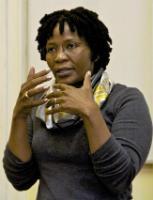
“The home is the site of struggle,” said Ms Nomboniso Gasa, “the central point of struggle.” Gasa, a researcher and analyst of gender, political and cultural issues, shared her thoughts about South African customary law at the talk, “Women in Tradition in Democracy”.
The role of women in a hybrid democracy needs to be further scrutinised, she argued. “What have we inherited, how to expand, renew and fortify it, becomes very complicated around the issue of women,” she said.
Explaining the pervasive issue of patriarchy in communities that adhere to customary law, she discussed chapter twelve of the constitution, which grants traditional leadership and customary law a legitimate place South Africa. There are gaps, however, she said. Regardless of the lawful ordination of traditional governance, the system should not be blindly and uncritically adhered to.
Ms Gasa discussed the messy history of customary law in South Africa. Although it was reformed through the Traditional Leadership Governance Framework Act, it grew directly out of the Bantu Authorities Act, which was implemented during apartheid for very different purposes.
Geographic location remains the most important factor determining the jurisdiction of traditional leadership, leaving people in these areas subject to a “tribal citizenship in which rights can only be accessed by being mediated through a traditional leader,” said Gasa.
Amongst other things, leaders in these former homelands are given the authority to arbitrate in community disputes and wield executive power over local resources, with the authority to grant and refuse a citizen’s right to own land.
Because of their traditionally subordinate place in this system, where it exists, women remain the most vulnerable. Shea called for an honest interrogation of state-approved traditional governance and the outmoded values that have informed it: “Redefinition of tradition along patriarchal lines is not accidental,” she said, asserting that apartheid ideals and the perverse interpretation of traditional laws, continue to dispossess, silence and displace women.
Although there are measures to correct the inequities in traditional leadership through the Traditional Courts Bill, Ms Gasa remained skeptical. She was scathing about such limp attempts to redress the issue of autocratic power and abuses happening in the name of tradition.
She insisted that questions around identity remain at the heart of constructing a better system: what do we want to take from tradition and what is its place in our current democracy?
Photo and story by Hailey Gaunt
